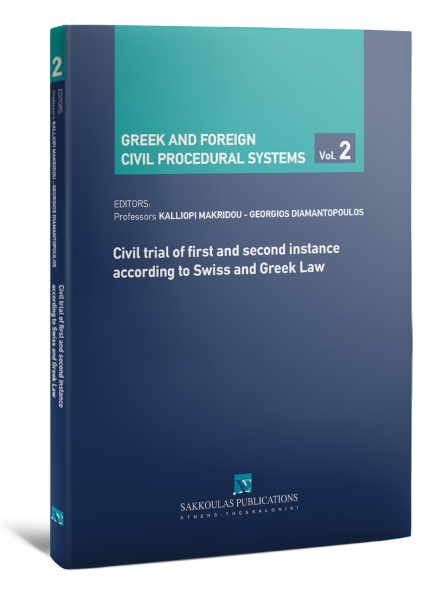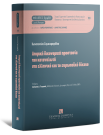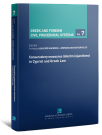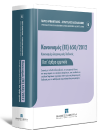I. Jent-Sørensen/I. Meier/Χ. Απαλαγάκη..., Civil trial of first and second instance according to Swiss and Greek Law, 2014

In the last years, civil procedural law has been in the course of constant change.
Such considerations have in principle incited us to organize international workshops on comparative analysis of Greek and foreign civil procedural laws in a systematic way at the Aristotle University of Thessaloniki. The contributions to such workshops have helped highlighting the similarities and differences between the compared jurisdictions and appreciating institutions functioning effectively. The benefits of those workshops would certainly be multiple, if their minutes were published in a series. Researchers, practicing lawyers and students will, thus, have the opportunity to refer to the relevant papers, in order to obtain an overview of different institutions and their functioning in various jurisdictions and keep the channels of communication with the international community open.
The second international conference, which took place in April 2014, focused on “Civil trial of first and second instance according to Swiss and Greek Law” forms the second volume of this series.
Our aim is to turn this endeavour into an incentive for a sustained and in-depth comparative research between civil procedural laws of various states and the Greek one, which constitutes, by the way, a law with a long history and rich theoretical and jurisprudential output. Through such a comparison, legal thought should get grafted with innovative concepts, escape from the well known and well established and develop a new dynamic potential. The more widespread and systematic the exchange of information and views at international level is, the more national systems will be revitalized and will work better for the benefit of their citizens. Our hope and prayer is that this series will contribute to a creative comparative research.
Πληροφορίες έκδοσης
Πίνακας περιεχομένων +-
Series Editors’ ForewOrd
TABLE OF CONTENTS
Grusswort (by Prof. N. Nikas)
Grusswort (by Prof. Α. Κοutsouradis)
Effizienz des erstinstanzlichen Verfahrens nach neuer schweizerischer ZPO (by Prof. Is. Meier)
1. Einleitung
2. Ziele und Instrumente eines effizienten Verfahrens aus theoretischer Sicht
3. Das erstinstanzliche Verfahren nach der schweizerischen ZPO
3.1. Ordentliches Verfahren
3.1.1. Tabellarischer Überblick
3.1.2. Anwendungsbereich und Verfahrensabschnitte im Einzelnen
a. Anwendungsbereich
b. Schlichtungsverfahren
c. Klageeinleitung und Vorbringen der Parteien
d. Säumnisentscheidung
e. Instruktionsverhandlung
f. Hauptverhandlung mit Beweisverfahren
g. Entscheidfällung
3.2. Vereinfachtes Verfahren
3.3. Grundstrukturen und Grundprinzipien des erstinstanzlichen Verfahrens nach schweizerischer ZPO
4. Beurteilung des erstinstanzlichen Verfahrens nach den Zielen eines effizienten Verfahrens und Verbesserungsmöglichkeiten
4.1. Einleitung
4.2. Modell des englischen Zivilprozesses als Anregung für das schweizerische Verfahren
4.3. Effizienz in der einverständlichen Streitbeilegung und in der Verfahrensdauer
4.3.1. Statistische Daten zur Verfahrensdauer und einverständlichen Streitbeilegung
4.3.2. Optimale Erreichung des Ziels, nach einer vergleichsweisen
Einigung zu suchen
4.3.3. Beurteilung des erstinstanzlichen Verfahrens nach schweizerischer ZPO unter den Gesichtspunkten der Verfahrensbeschleunigung
4.4. Effiziente Erlangung einer Säumnisentscheidung im Entscheidverfahren und Zahlungsbefehlsverfahren
4.5. Problem der exorbitanten Verfahrenskosten und der unzureichenden unentgeltlichen Prozessführung
4.6. Effektivität der Wahrheitsfindung
4.6.1. Einleitung
4.6.2. Förderung der Wahrheitsfindung durch ausgedehnte materielle richterliche Verfahrensleitung
a. Weitreichende richterliche Fragepflicht ergänzt mit der Untersuchungsmaxime
b. Freie Erörterung der Streitsache
4.6.3. Umfassende Zulassung aller möglichen Beweismitteln und weitreichende Pflicht der Parteien zur Mitwirkung im Beweisverfahren
4.6.4. Problematik der relativ strengen Eventualmaxime
4.6.5. Problem der Entscheidfällung, welche in erster Linie auf die Parteibehauptungen abstellt und der Beweisabnahme nur eine relative geringe Bedeutung beimisst
Rechtsmittelsystem und -verfahren nach schweizerischem Recht (by Prof. In. Jent-Sørensen)
1. Das Bundesgerichtsgesetz von
2. Das Obergericht des Kantons Zürich als oberes kantonales Gericht und als Rechtsmittelinstanz in Zivilsachen
3. Das kantonale Organisationsrecht
4. Das Rechtsmittelverfahren nach der schweizerischen Zivilprozessordnung
a). Die allgemeinen Bestimmungen der ZPO im Rechtsmittelverfahren
b) Die Rechtsmittelarten und ihre Ausgestaltung
c) Die Tauglichkeit der ZPO-Rechtsmittel und die Verfahrenseffizienz
aa) Die Rechtsmittelfristen
bb) Die Auswirkungen auf die standesrechtlichen Bestimmungen
cc) Der Kostenvorschuss
dd) Die unentgeltliche Rechtspflege.
ee) Die „Schnellerledigungen“
ff) Das Antragserfordernis und die Begründungspflicht
gg) Sofortige Vollstreckbarkeit
5. Fazit
Vorsorgliche Beweisführung zur Wahrung eines „schutzwürdigen Interesses“ nach Schweizerischer ZPO – ein Vorbild für das griechische Recht? (by Sotirios Kotronis)
Ι. Einleitung
II. Vorsorgliche Beweisführung zur Wahrung eines „schutzwürdigen Interesses“
1. Ziel und Funktion
2. Anwendungsbereiche und praktische Bedeutung
3. „Schutzwürdiges Interesse“ als Voraussetzung für die vorsorgliche Beweisführung
III. Das schweizerische Recht als Vorbild für das griechische Recht?
1. Geltendes griechisches Recht
2. Notwendigkeit der vorsorglichen Beweisführung zur Wahrung eines „schutzwürdigen Interesses“ im griechischen Recht
3. Das schweizerische Recht als Vorbild – Ausblick
Presentation of the Draft Reform of the Code of the Greek Civil Procedure Code: Ordinary and Special Proceedings of the Courts of First Instance (by Prof. Ch. Apalagaki)
Ι. The Greek Legal System in Civil Trial
II. On the background and the development of the Greek Civil Procedure Code
III. Procedure before the Courts of First Instance. The new structure of the procedure
IV. Special proceedings, before the Courts of First Instance
Appellate proceedings according to Greek law (by Prof. G. Diamantopoulos)
Ι. Introduction
ΙΙ. Conditions to admissibility.
A. Appealability
1. General
2. The final character of the appealed judgment
3. Conclusive judgments. Partly final judgments
4. Non-appealable judgments
5. Default judgments
B. Legitimation and legal interest
1. Active legitimation
2. Passive legitimation
3. Legal interest
C. Way and time of filing appeal
1. Lawful filing of appeal
2. Appeal period
D. Prohibition of repeat appeal
ΙΙI. Grounds for appeal
A. General aspects
Β. Additional grounds for appeal
ΙV. The effects of appeal
A. Suspensive effect
B. Devolutive effect
C. Effectus communicativus
V. Appellate proceeding
A. Proceeding before the second instance court
Β. Subject-matter of appellate proceedings
VΙ. Judgment on appeal
VΙΙ. The effects of the procedural reform of 2014 on the appellate proceedings
A comparison between the Swiss and the Greek civil justice system. Concluding remarks (by Prof. K. Makridou)
Ι. ADR methods
ΙΙ. The influence of European developments
III. The importance of procedural formalities
IV. Acceleration mechanisms
A. Proceedings in first instance
A1. The pre-trial stage
A2. The change from single judges to panels
A3. The oral or written form of the procedure
A4. Simplified and summary procedures
A5. E-trial
B. Ordinary Remedies-The appellate proceedings
V. Litigation costs-Legal representation





















